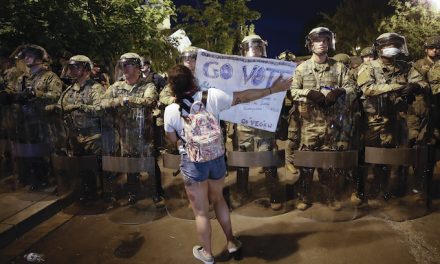A federal judge Tuesday denied a preliminary injunction sought by three Christian schools who filed suit challenging Oregon Gov. Kate Brown’s executive order that restricts in-class instruction for kindergarten through 12th grade education due to the coronavirus pandemic.
Attorney John Kaempf, representing Horizon Christian School, McMinnville Christian Academy and Life Christian School, had urged the judge to halt the governor’s executive order and allow the three schools to reopen with in-person classes and proper safeguards in place.
He argued that gathering communally is a tenet of Catholic education, and not allowing the schools to hold in-person religious classes violates their freedom of religion and expression. He said the parochial schools want to be treated similarly to daycares or grocery stores.
U.S. District Judge Michael W. Mosman said he found it “utterly implausible,” that the governor’s motive behind her executive order was to shut down religious schools.
While there’s no doubt the restrictions are financially harmful to private religious schools and may cause some to close, “all other hardships must bow to the goal of protecting human life,” the judge said, ruling from the bench.
The judge found the schools were not likely to succeed at this stage of the case.
Mosman’s ruling comes amid a troubling upward trend as the virus spreads throughout the state and across the country. Additional restrictions meant to stem the spread, issued by the governor last week, were set to go into effect on Wednesday, as the Oregon Health Authority announced 13 new deaths and 935 new suspected or confirmed coronavirus cases.
The case centers around the governor’s June 24 Executive Order 20-29, which provided that on-site instruction may take place in public and private K-12 schools only if it meets guidance issued by the Oregon Health Authority and Oregon Department of Education.
During Tuesday’s hearing, Kaempf called Yamhill County Commissioner Mary Starrett to testify, who shared that during an Aug. 5 weekly call with two of the governor’s representatives, one answered her question when she asked why private and parochial schools weren’t allowed to reopen.
According to Starrett, Leah Horner, the governor’s jobs and economic policy adviser, told her there was a concern about a “mass exodus from public schools” if private schools were permitted to reopen and public schools were not.
Starrett said she shared Horner’s comments on Facebook immediately after the call because she said she found it “jarring enough and stunning enough, quite frankly, that I didn’t wait to post it” to inform her constituents.
Lawyers for the governor responded that Horner’s statement was taken out of context.
“I did not mean to imply that there would be an exodus from public schools if private schools reopened and public schools did not,” Horner wrote in her own response to the court. “I was merely mentioning the possibility that if, for whatever reason, students disenrolled from a public school, that school would lose some of its state school funds. I was just trying to educate the officials on the conference call as to what these decisions look like on a broader scale.”
Kaempf also argued that the state’s decision not to distribute to parochial schools any of the 5 million personal protective masks the state received this summer from the federal government represented religious discrimination.
He submitted to the court an exhibit that showed the state had received 5 million free KN95 masks from the Federal Emergency Management Agency this year, but did not distribute any to private schools, only public schools.
In a July 23, 2020 text message the plaintiffs obtained during discovery, Colt Gill, deputy superintendent of public instruction for the Oregon Department of Education, wrote, “I think you are aware that we were able to land 5 million non-medical kn95 face coverings. I plan on distributing these to school districts with a formula based on enrollment with a weighting for poverty. I did not plan on providing any to private schools.”
Marc Abrams, the attorney representing the governor, defended the state’s actions.
“We got 5 million pieces of protective gear and decided only to give them to public schools, which is absolutely legal,” he said. “It’s our property. We decided to keep it within the taxpayer’s realm.”
— Maxine Bernstein
___
(c)2020 The Oregonian (Portland, Ore.)
Visit The Oregonian (Portland, Ore.) at www.oregonian.com
Distributed by Tribune Content Agency, LLC.
—-
This content is published through a licensing agreement with Acquire Media using its NewsEdge technology.



















Recent Comments